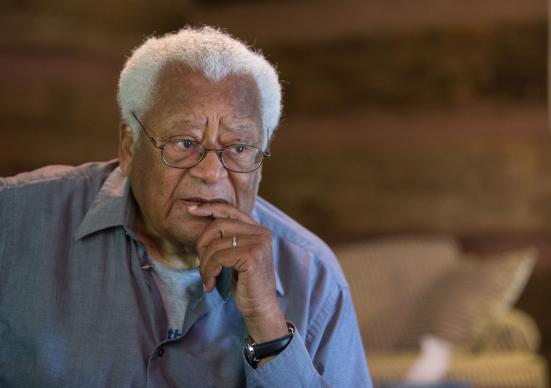Civil Rights leader Rev. James Lawson continues to dream and to encourage action toward a nonviolent nation.
KATHY L. GILBERT
United Methodist News Service
A great social awakening that started with the civil rights movement is gaining strength today with the Black Lives Matter movement, said the Rev. James Lawson, a United Methodist pastor who the Rev. Martin Luther King Jr. called “the leading theorist and strategist of nonviolence in the world.”
Missing from today’s activism, however, is the strategy of nonviolence, he said.
Lawson, the son and grandson of Methodist pastors, received his local preacher’s license in 1947 when he graduated from high school. He was introduced to the nonviolence teachings of Gandhi when he joined the Fellowship of Reconciliation, America’s oldest pacifist organization, during his college days. He spent three years in India as a missionary.
Lawson introduced the principles of Gandhian nonviolence to King and other leaders of the 1960’s civil rights movement.
“BLM (Black Lives Matter) is exposing still another change in the movement towards our future because the issue of police brutality and killing is the issue of slavery. It’s the issue of the lynchings of the 20th century for which we have more than 6,000 documented experiences. It is the issue of deaths that occur in jails that are called suicide, but they are beatings and killings.”
Toward a nonviolent nation
Lawson’s life work has been to create a nonviolent nation.
“I maintain the continuance of the nonviolence movement that Rosa Parks and the Rev. Martin Luther King Jr. sparked in December 1955,” he said.
But his dream is still far from becoming reality, he added.
“Churches and synagogues and temples have not yet decided we have enough violence in our country and in our world so they have not yet decided to un-bless violence and war.”
He pointed to domestic violence, verbal abuse, bullying of people of different races or cultures or people who have different sexual orientations from heterosexuals, as examples of the type of violence many religious groups condone.
Lawson spoke to United Methodist News Service while he was in Clinton, Tennessee participating in the Children Defense Fund’s Proctor Institute, held on a farm once owned by Alex Haley, the author of “Roots.”
He is a consultant for the Children’s Defense Fund and has been a part of the annual Proctor Institute for several years. The 2016 lectures were held July 18-22 with the theme “Praying with Our Feet: Pursuing Justice for Children from the Sanctuary to the Street.”
The Children’s Defense Fund and United Methodist Women are two of the oldest agencies working to make children the center of policy and practice in government, he said.
“Because I’m convinced, Gandhi was convinced … the agenda of the human race is an agenda different from the power brokers who have lived in every generation and in every century.”
Power brokers want domination, wealth and control, Lawson pointed out.
“But we, the people, have never deviated from our agenda, which is the agenda of taking care of our children and our families, influencing their lives, nurturing them, sustaining them, doing the work of the family and the home, caring for our immediate environment.”
Going the wrong way
In Lawson’s opinion, “More people today are more aware than ever before that our society is moving in the wrong directions.”
He is convinced that awareness helped elect the first black president, President Barack Obama, in 2008.
Obama formed The White House Task Force on 21st Century Policing in the wake of officer-involved killings of black men.
Black Lives Matters can count that as a major accomplishment, Lawson said.
“In some ways you have to be patient to allow history to take its time to get you to the point where you want to do something.”
“Because the major thing that happens in the nation so often is when people raise an issue of concern that is affecting the lives of millions so often it is always passed over and forgotten instantly,” he said. “We do not have a sense in the U.S. today that many of our ailments are curable.”
The black community is now saying those killings are unjustified. But others must also become convinced, he said. “In some ways you have to be patient to allow history to take its time to get you to the point where you want to do something.”
Several years of nonviolence campaign precipitated the Voting Rights Act of 1965.
“We in the King movement knew we were a movement seeking to help this country move into becoming a democratic society with equality and liberty and justice for all.”
Put on the right path
At age 87, Lawson is still guided by a lesson he learned when he was in grade school.
He had his first encounter with racism on a street in Ohio. A young white child sitting in a car leaned out the window and hurled the ‘N’ word at him.
“I went over and slapped the boy and went on home,” he said. He sat down at the kitchen table, his mother was working on dinner, and he told her about the incident.
“Without turning to me she said, ‘Jimmy, what good did that do?’”
On that afternoon, his mother, Philane May Cover, gave her son a lesson he has never forgotten about what it means to be a child of God, loved by Jesus. She told her young son that name-calling could not possibly harm him.
“And her last sentence was, ‘Jimmy, there must be a better way.’ And so in many ways that’s the pivotal event of my life,” Lawson said.
Last Updated on January 30, 2024

